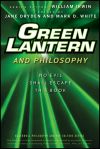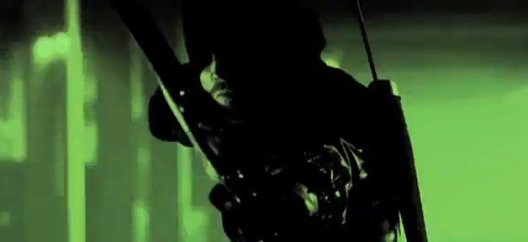Arrow and Philosophy:
The Ethics of Retributive Justice
Joseph J. Foy
Oliver Queen was a trust-fund, billionaire playboy whose only cares in life were throwing the biggest, most lavish parties and finding a way to hide the fact that he was sleeping with his girlfriend’s sister. However, when his father’s yacht sinks, killing his girlfriend’s sister and leading to the death of his father, Oliver ends up stranded on an island where many perilous encounters leave him struggling for survival. When he is eventually rescued, Oliver returns to his home in Starling City with a small book he received from his father containing a list of names of the wealthy and powerful who have subverted and corrupted the city to further their own privilege. In order to atone for the sins of his father, as well as for his own, Oliver transforms himself into a hooded vigilante who tracks down the wealthy who plague Starling City, destroying their mini-fiefdoms and attempting to return Starling City to a state of justice. Known by many aliases (The Hood, Arrow, Green Arrow, Emerald Archer, etc.), Oliver struggles to maintain his secret identity in order to protect his family and those he cares about while giving his life in service to his mission of what he sees as retributive justice.
The television series Arrow, which is currently in its third season, invokes many familiar plotlines associated with the superhero genre in which a rogue champion works outside of the law in order to seek justice and maintain order. A consistent theme in the series, however, is one related to drawing sharp distinctions between the relatively murky waters of “retributive justice” and “vengeance.” This is most prominently introduced in season one, episodes 7 and 8 when Oliver encounters Helena Bertinelli. Helena adopts the vigilante personae of “The Huntress” in attempt to seek revenge on her father (mob boss Frank Bertinelli) for having her fiancé killed in an effort to stop him from going to the FBI with evidence that would destroy the Bertinelli crime family. Got that?
The concept of justice takes on many forms in political theory. In the series Arrow, questions of justice revolve around the distinction between retributive justice and revenge or vengeance. Such distinctions, though often conflated and confused in popular discussion, are important to political theorists, as well as to ongoing legal debates about vigilantism, capital punishment, and self-defense. The American philosopher Robert C. Solomon argues that revenge (retaliation for harm done to us) and vengeance (retaliation for harm done to others) are at the core of justice. Citing examples of Homeric epics and Old Testament notions like “an eye for an eye,” Solomon states that “vengeance is the original meaning of justice.”[1] Although he acknowledges that there are limits to how far the principles of vengeance can be extended while remaining within the realm of justice (e.g., it might be acceptable to arrest someone for stealing electronics from a chain retailer but it would be unacceptable to hang someone for the same act), Solomon contends that the emotional reaction people experience from being victimized by, or even witnessing, an injustice is an understandable, legitimate reaction. When Helena suffers deeply over the death of her fiancé, it is natural that she desires to “even the score.” Getting even with the perpetrators of that injustice would provide a catharsis for Helena and would have the potential spillover benefit of deterring similar acts in the future.
The question remains, however, as to whether Helena’s slaying of the members of the Bertenelli crime family is truly justice. To placate her fury over her fiancé’s execution, Helena targets and slays multiple individuals in an effort to begin a war between her father’s mob and the Triad crime syndicate (a rival, foreign mafia that threatens the peace in Starling City). Oliver attempts to convince her that this type of revenge or vengeance is not justice and to persuade Helena to work with him to undo the organization’s power without recklessly creating a situation that would ultimately cost the lives of many innocent people.
But how is what Oliver does any different? He has, at times, taken lives (most notably, his early killing of Deadshot in season 1, episode 3), and his mission of justice has resulted in copycat killings and hostage-taking by “Black Arrow” (season 1, episode 9). In Solomon’s terms, the difference between what Oliver does and what Helena does would be that Oliver is working from a framework of self-contained violence. For revenge and vengeance to be considered just, according to Solomon, it must contain, or at least be cultivated to contain, “the elements of its own control; a sense of limits, a sense of balance.” [2] Oliver’s mission, as opposed to Helena’s, is limited to targeting individuals who are either on a list of notorious figures who have built their wealth through nefarious means on the backs of the people of Starling City, or directly responding – in a restricted fashion – to the criminal activities of individuals who must be stopped lest they harm even more people in the future. Here we see Solomon’s perspective on retributive justice brought to fruition; a crime fighter whose crusade is limited, self-contained, and precise.
Philosopher Robert Nozick gives an even clearer account as to why Oliver’s quest as “The Hood” aligns more closely with philosophical conceptions of justice than Helena’s quest for vengeance as “The Huntress.” According to Nozick, retributive justice differs from revenge along five procedural dimensions:
- Retribution is for an “actual,” as opposed to perceived harm.
- Retribution is contained to a level of proportional response for the wrong committed.
- Retribution is an impersonal, rational response to a wrong committed and not an emotionally-based response that can be illogical in nature.
- Retribution is a detached act from which little pleasure is derived, as opposed to revenge in which the individual is deriving a cathartic pleasure from “getting even.”
- Retribution conforms with established (often legalistically codified) principles of justice, as opposed to revenge which takes on a much more subjective tenor.[3]
This is not to say that Nozick would entirely condone Oliver’s vigilantism, but it does help to establish a clearer distinction between The Hood and The Huntress.
In looking at the first of Nozick’s criteria, it could be said that both Oliver and Helena are meeting the first condition. Both are responding to actual harms; Oliver the corruption of Starling City, Helena the assassination of her fiancé. However, as The Hood, Oliver is taking aim (bad pun intended) at specific violators who have committed very specific acts of injustice. The Huntress, on the other hand, is projecting the specific harm done to her and her fiancé to larger and larger groups of people who were not directly responsible for the particular act for which she is holding them accountable. This moves into Nozick’s second criterion of proportionality. Oliver’s quest may involve many individuals, but that is because he is directly and proportionally responding to each unjust act they have committed. Helena’s mission lacks definition or proportion. She looks to create a war between two criminal organizations that could ultimately tear apart the city. There is no sense of proportion to her acts, as she is not trying to limit acts to direct response to actual harms for which her targets are accountable.
When we look at the third and fourth criteria offered by Nozick, it is clear that the detached rationalism of The Hood is not operating on a subjective level that is designed to give him cathartic pleasure. He takes no enjoyment from his burden. When he does begin to stray from the detached pursuit of justice, his partner and friend John Diggle is there to help bring him back around and see facts more objectively. Diggle helps keep Oliver honest (not an easy task for anyone dealing with members of the Queen family). The Huntress, on the other hand, acts alone and purely out of a subjective desire to get even; her appetite for payback clouds any sense of logical rationalism when it comes to her mission of revenge. These principles again help us to distinguish between the actions of Green Arrow and The Huntress.
But would Nozick condemn both Hood and Huntress for not conforming to principles of justice in their entirety? By breaking the law, isn’t Oliver necessarily being unjust? In his fifth criterion, Nozick suggests that by stepping outside of legitimately established legal principles that are designed to reflect principles, one is stepping outside of the rubric of justice. In this respect, Nozick sounds much like Detective Quentin Lance who argues that no matter what good ends may result from The Hood’s vigilantism his actions can never be just because he is violating the law. So is The Hood really any better than The Huntress?
This question is not an easy one to answer. If we could be assured that the laws and the institutions designed to monitor and enforce the laws in Starling City were aligned with the principles of justice, then Oliver’s vigilantism would most certainly be operating outside of the realm of justice. However, recall that his entire mission is predicated on the wealthy and powerful of the city corrupting its laws and institutions to their own ends. If the laws themselves do not conform to justice in an objective sense, then Nozick’s condition may be satisfied if Oliver’s actions are helping to correct this corruption. This again sets Hood apart from Huntress, as Oliver is working to bring the system back into alignment with justice, whereas Helena is seeking only to create destruction and pain for those whom she feels are deserving.
Principles of justice are complex and not easily categorized. Neither The Hood nor The Huntress is working within an established framework of principles codified into law by the legitimately recognized governing power of the state. Yet even within their vigilantism, there is a difference between a limited form of targeted retribution and acts of revenge that know no limitations. The Hood engages in targeted strikes that do not open a cycle of ongoing violence that could have negative repercussions on innocent bystanders.[4] Oliver Queen’s quest illustrates the point that principles of justice cannot be given over to mere subjectivism and personal quests for revenge or vengeance, whereas Helena Bertinelli’s acts do not show any such detachment. Because Helena’s ongoing quest for personal satisfaction will likely yield a never-ending cycle of response-and-retribution, the principles of justice are more aligned with Oliver’s self-imposed mission than Helena’s.
Joseph J. Foy is associate professor of political science, and associate campus dean at the University of Wisconsin-Waukesha. Foy is the editor of Homer Simpson Goes to Washington: American Politics through Popular Culture and SpongeBob SquarePants and Philosophy, and co-editor of Homer Simpson Marches on Washington: Dissent through American Popular Culture and Homer Simpson Ponders Politics: Popular Culture as Political Theory.
- Robert C. Solomon, “Justice and the Passion for Vengeance,” in A Passion for Justice (Reading, MA: Addison Wesley, 1989), reprinted in What is Justice: Classic and Contemporary Readings, ed. Robert C. Solomon and Mark C. Murphy (New York: Oxford University Press, 1990), 292.
- Solomon, “Justice and the Passion for Vengeance,” p. 293.
- See Robert Nozick, Philosophical Explanations (Cambridge, MA: Belknap Press of Harvard University Press, 1989), pp. 366-368.
- In season 1, episode 9 it is suggested that the existence of the Hood has given rise to a copycat vigilante that ends up taking hostages until The Hood reveals his secret identity. However, Malcolm Merlyn (aka, The Dark Archer) was already engaged in a nefarious conspiracy to destroy thousands of lives as part of his ultimate plan for Starling City. The presence of The Hood only caused him to become more overt in his efforts and try to mask it as a copycat.
| You might also like: |  |
| View the complete list of books: |  |


